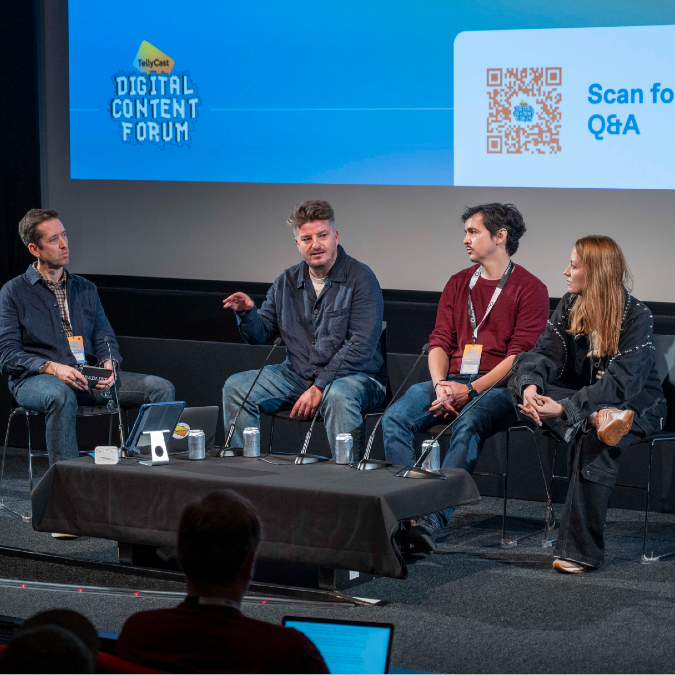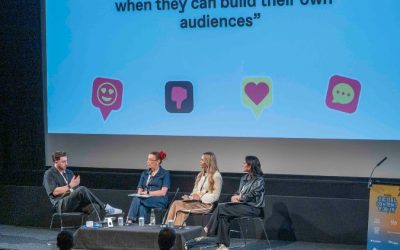Micro dramas have been the talk of the digital content and TV industries alike this year, especially since reports that these formats are already a $7bn annual business in China.
These short-form scripted dramas are designed for snacking on mobile phones, but also binge-viewing, with a robust subscription economy already ensuring they generate impressive revenues.
Is this just a fad, though? A panel at TellyCast’s Digital Content Forum 2025 this morning pondered the trend. Moderator Stewart Clark (Deadline) picked the brains of Katharina Gellein Viken (Metrotone Studios), Matt Campion (Spirit Studios) and Victor Potrel (TheSoul Group).
Campion talked about Spirit Studios’ entry into micro dramas, building on its work in audio dramas and scripted social content. About eight months ago it began research and meetings to explore vertical drama.
“We’re producing our first film… we try to be in that MVP model – minimum viable product – where you get something up very quickly, get the results and iterate,” he said. “We’ve had loads of meetings with some of the big apps, we’ve got a team that’s begun writing our first drama, and we’re gong to shoot in the next couple of months. The shoot is eight weeks, so it’s pretty quick.”
Potrel offered TheSoul Group’s perspective. “It’s something we looked at maybe two years ago and started to see the premise of it, and we started to get really serious about it at the start of this year. And we launchd our own app two months ago,” he said. “We produce content for the app and also work with partners. We have about 30 shows on our app now.”
If you’ve spent any time browsing a popular micro dramas app, you’ll know what the dominant genre is. “Romance is what’s created the category, I’d say,” said Potrel, who encouraged the TellyCast audience not to be snobbish about this. “It’s a genre you need to embrace and be curious about,” he said, comparing attitudes towards romance micro dramas now with how the TV world reacted to YouTubers when they first emerged, dismissing their content as low-quality.
There are some strong rules to successful micro dramas too. “You need every 45-60 seconds to have some strong emotion, some moments of truth,” he said. “People watching these kinds of shows are very busy, and they’re usually young.” Scripting drama with a cliffhanger every minute is one of the requirements – not least to ensure people watch (and often, pay for) the next episode.
Viken noted that some traditional TV skills are well-suited to micro drama production. “Unscripted producers are really good in this environment,” she said. “We know how to produce things fast.”
Her company is working on two productions: One is a “K-Pop crime thriller” called Raynmaker, which is written by humans, but produced (music included) entirely using GenAI tools.
“We started by making music videos and then this micro drama pilot,” she said. “That’s tested really well with the audience, and now we have some big partners on board, we’re going to go with 22 episodes in Spring.”
The panel agreed that one of the key challenges in micro dramas is deciding which platforms they should live on. “Everything doesn’t naturally live on every platform. A TikTok thing will not necessarily work on YouTube,” warned Viken.
“I can’t take my animated K-Pop crime thriller and just put that on RealShort, because ReelShort is optimised for romance and CEO-drama,” she added. But Viken expects there to be more suitable options as time goes on. “I think we’re gong to se a lot more platforms pop up, as people move on from very low-end soapy dramas,” she said.
Campion talked about his company’s plans. “We are solely focused at the beginning on nailing the first micro drama and getting it onto the right app,” he said. “A good success is about 15 million views. Something like The Mafia Boss [a hit series] has done 150 million. And the average spend from a user is 50p an episode.”
“The micro drama platforms have made a LOT of money,” agreed Viken.
AI is looming large in the micro dramas space as a production tool. TheSoul Group has been testing the technology out, although Potrel said that “pure AI content may have its moment, but for now it’s maybe a separate experience – a Sora-like app where you go to have a brainrot experience!” – a reference to OpenAI’s Sora app, which recently launched as a showcase for GenAI clips made using the Sora 2 model.
Budgets for a micro drama series are currently tending to range between $100k and $300k, which is why AI appeals as a way to not just bring down costs, but also to create sets that would otherwise b out of the budget.
“You do things a lot faster,” said Viken. “I’m a big believer in hybrid content, I don’t have a lot of faith in people wanting to watch all-AI content… uncanny things.”
“We’re not replacing people,” said Campion. “We’re at a stage whee if you are punching above your weight on a small budget and it enhances what you do, then great, but have taste in how you use it. There’s really shit AI [content] out there. We all see it!”
What is the future of micro dramas? “You can feel it rapidly just flooding into Europe. It won’t just be drama. There will be other formats and genres in this space,” said Campion.
“I see the rapid acceleration,” agreed Potrel. “You need to evolve over time, the same structure but add some elements like fantasy or thrillers… There will probably be some consolidation on the apps side too. Thee’s a lot of them.” He also said there will be more local content, with micro dramas in the west currently dominated by English-language formats.
“We’ll see new platforms,” agreed Viken. “And just from a content creator’s perspective, we have to think from the get-go about multiple formats and multiple platforms, in terms of your script, in terms of your output. Does it work on all these platforms? You have to work on your strategy early.”





